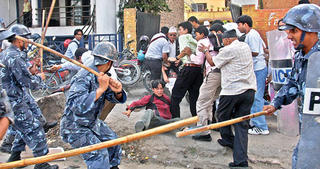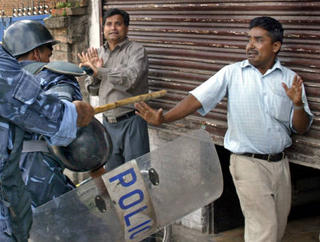


Radio Dovaan July 24 Program Minute 26:15, Minute 43:50
Shambhu Thapa At Bichar Bimarsha Samudaya Audio 34 minutes, 59 seconds July 16th
Shushil Pyakurel 16 minutes, 12 seconds
Gopal Siwakoti 12 minutes, 53 seconds
I managed to ask two questions:
- The seven parties have finally come around to the idea of a Constituent Assembly, which is to say they now agree the 1990 constitution is dead. But the demand that the 1999 parliament be revived is to suggest maybe that is not so. Don't you think their sticking to the revival demand is what is hampering mass participation in the movement for democracy?
- Like the king looks regressive to the Bahun democrats, the Bahun democrats look regressive to the DaMaJaMa. What do you think of that?

It is like with these NC, UML types you almost have to read their names backwards to get a feel for where they are coming from.
This was the first time I listened to this radio program. Is this the only Nepali language radio in the US? I think their presentation was pretty impressive. Good thing they archive their shows, so people can access the programs on their own schedule, and from wherever in the world.
They might want to present themselves as some kind of a portal for audio content on the web in the languages of Nepal. Just a thought.

In The News
- 30 injured in Nepal clash Hindu, India ..... At least 30 people, including two ex-ministers, were injured here today as riot police baton-charged protestors demanding release of former Nepalese prime minister Sher Bahadur Deuba from detention..... raising slogans like 'Release our leader, scrap the illegal Commission' and 'We want a republic'..... protestors also pelted stones at the police...Homnath Dahal and Prakash Sharan Mahat
- Police, Protesters Hurt in Nepal Clashes Guardian Unlimited, UK
- Police, protesters hurt in Nepal clashes
Boston Globe Nepalese police battle protesters, more than 24 hurt USA Today Supporters of sacked Nepali PM clash with police Reuters AlertNet - Nepal political leaders ask govt to back India's UNSC bid Outlook (subscription), India .... the importance of New Delhi could not be ignored in the present global context..... since Nepal expressed its willingness last year to back India and other G-4 countries seeking permanent seats in UNSC, it would be regretful if it now uses its support as a "bargaining chip" in case of New Delhi..... Hridayesh Tripathi, leader of Nepal Sadbhavana Party (A), said Nepal should not ignore the importance of a neighbouring country like India.
- Police, protesters hurt in Nepal clashes San Jose Mercury News, United States
- Relevance of Monarchy in Nepal Samudaya.org, AZ
- Restructuring Of Local Bodies for Full Devolution PeaceJournalism.com, Nepal
- Ball in Maoists' Court says Alliance Himalayan Times, Nepal
- US for restoration of democracy: Daschle Kantipur Online, Nepal
- Police, protesters hurt in Nepal clashes The State, SC
- Police, protesters hurt in Nepal clashes Duluth News Tribune, MN
- Police, protesters hurt in Nepal clashes Wilkes Barre Times-Leader, PA
- Police, protesters hurt in Nepal clashes Monterey County Herald, CA
- Police, protesters hurt in Nepal clashes Biloxi Sun Herald, USA
- Police, protesters hurt in Nepal clashes Columbus Ledger-Enquirer, GA
- Police, protesters hurt in Nepal clashes Macon Telegraph, GA
- Police, protesters hurt in Nepal clashes San Luis Obispo Tribune, CA
- Police, protesters hurt in Nepal clashes Grand Forks Herald, ND
- Police, protesters hurt in Nepal clashes Miami Herald, FL
- Police, protesters hurt in Nepal clashes Pioneer Press, MN
- Police, protesters hurt in Nepal clashes philly.com, PA
- Police, protesters hurt in Nepal clashes Tallahassee.com, FL
- Police, Protesters Hurt in Nepal Clashes Guardian Unlimited, UK
- Police, protesters hurt in Nepal clashes Fort Wayne Journal Gazette, IN
- Police, protesters hurt in Nepal clashes Bradenton Herald, United States
- Police, protesters hurt in Nepal clashes Myrtle Beach Sun News, SC
- Police, protesters hurt in Nepal clashes Kansas.com, KS
- Police, protesters hurt in Nepal clashes Charlotte Observer, NC
- Police, protesters hurt in Nepal clashes Fort Wayne News Sentinel, IN
- Police, protesters hurt in Nepal clashes Centre Daily Times, PA
- Police, protesters hurt in Nepal clashes The State, SC
- Police, protesters hurt in Nepal clashes Kansas City Star, MO
- Police, protesters hurt in Nepal clashes Kentucky.com, KY
- Police, protesters hurt in Nepal clashes Akron Beacon Journal, OH
- Police, protesters hurt in Nepal clashes Tallahassee.com, FL
- Police, protesters hurt in Nepal clashes Wilkes Barre Times-Leader, PA
- Police, protesters hurt in Nepal clashes Tallahassee Democrat, FL
- Police, protesters hurt in Nepal clashes Kansas.com, KS
- Police, protesters hurt in Nepal clashes San Luis Obispo Tribune, CA
- Police, protesters hurt in Nepal clashes Grand Forks Herald, ND
- Police, protesters hurt in Nepal clashes Fort Worth Star Telegram, TX
- Police, protesters hurt in Nepal clashes Aberdeen American News, SD
- Police, Protesters Hurt in Nepal Clashes Dateline Alabama, AL
- Police, protesters hurt in Nepal clashes Monterey County Herald, CA
- Police, protesters hurt in Nepal clashes Contra Costa Times, CA
- Police, protesters hurt in Nepal clashes Bradenton Herald, FL
- Police, Protesters Hurt in Nepal Clashes The Ledger, FL
- Police, protesters hurt in Nepal clashes OregonLive.com, OR
- Police, protesters hurt in Nepal clashes MLive.com, MI
- Police, protesters hurt in Nepal clashes Times Picayune, LA
- Police, Protesters Hurt in Nepal Clashes Tuscaloosa News (subscription), AL

